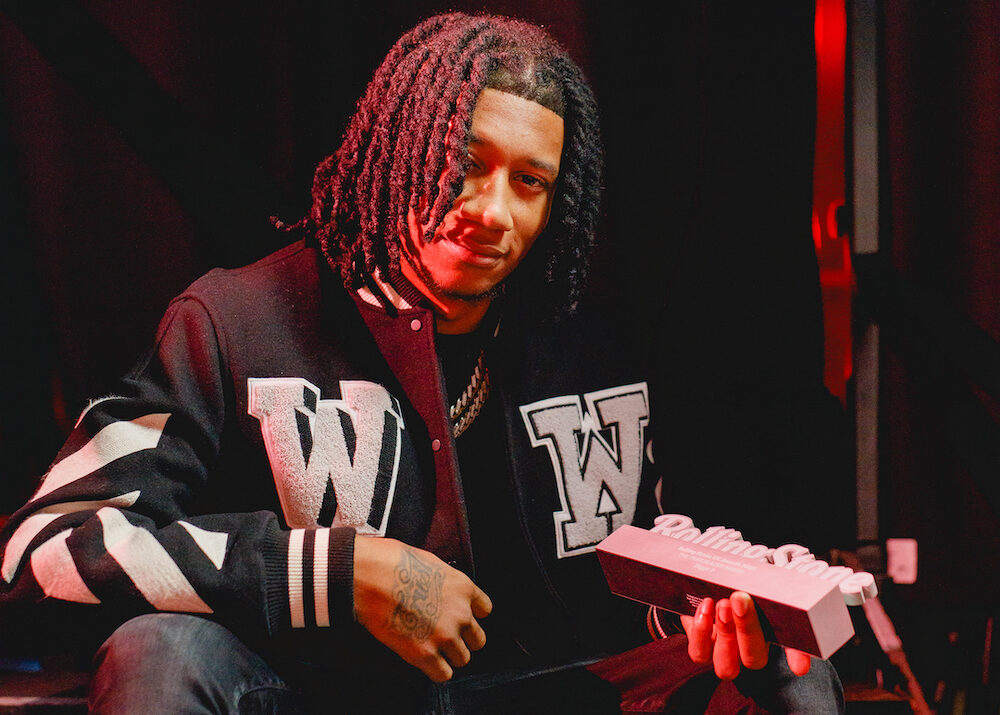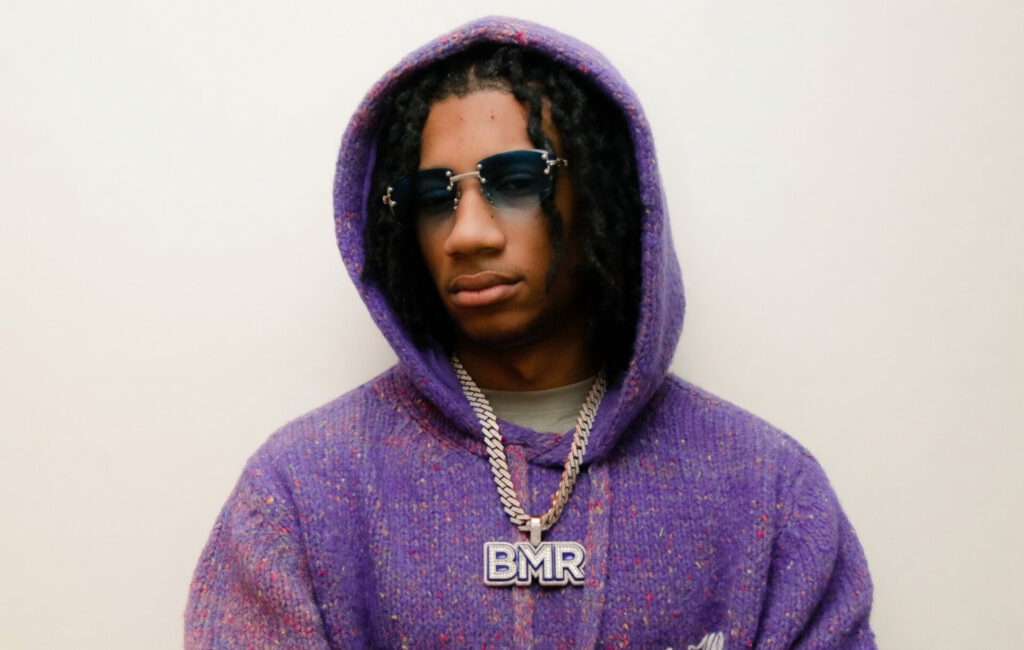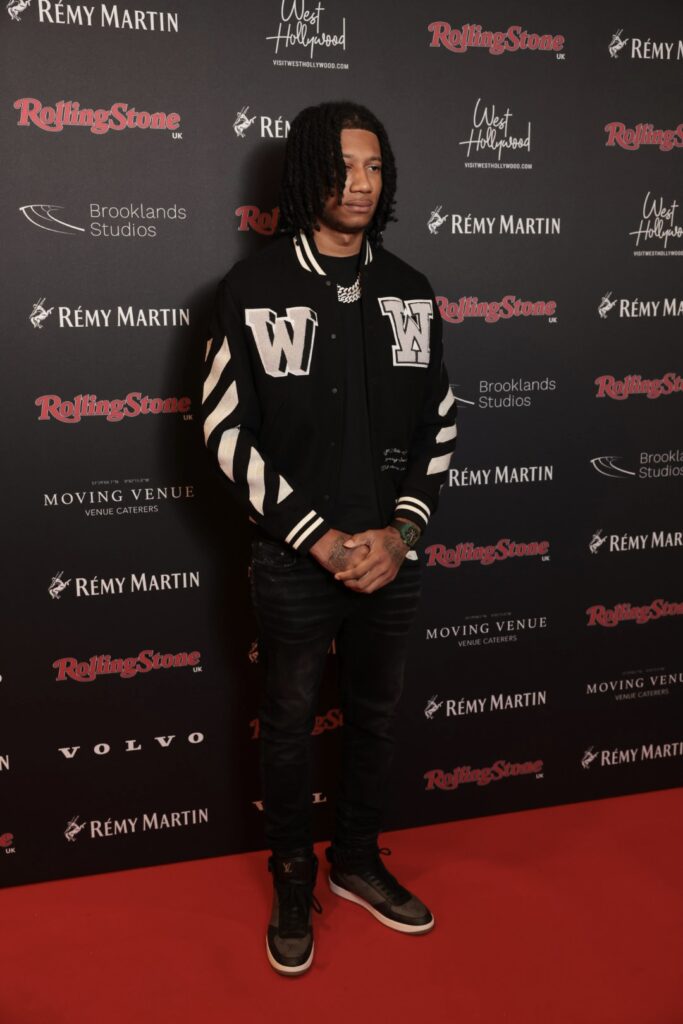How Digga D became a trailblazer
The drill pioneer who turned his life around. Digga D is the winner of the Trailblazer Award at the Rolling Stone UK Awards in collaboration with Remy Martin

Drill pioneer Digga D is clocking global fame and making hip-hop history with an arsenal of bold bars that articulate the complexities of the world around him whilst inspiring the new wave of rappers and marginalised youth towards their incalculable sonic potential.
Digga D’s rise has been exponential. Since making headlines and seismic waves in the UK music scene in 2017 he’s racked up half a billion global streams, released multiple top 10 tracks, been the subject of a BAFTA award-winning documentary ‘Defending Digga D‘, and put out a #1 mixtape Noughty by Nature which beat the likes of Ed Sheeran and Olivia Rodrigo. Fast forward to 2023, and at 23 years old, he was the youngest rapper to headline the prestigious Royal Albert Hall, launched his own record label, Black Money Records, as well as a critically lauded fourth mixtape, Back to Square One that cements his music status and commitment to personal growth.
A beast with bars, Digga D flexes a staggering lyrical dexterity with a comic wink that outstrips most of his drill rap peers alongside battle tactics to leverage his talent with strategy and an otherworldly tenacity to rap through adversity.
He might have dropped out of school at 14, but Digga D is a class-leading graduate of the fiercely raw underground rap subgenre of drill. A genre which has percolated through localised London communities since its inception in 2011 against the forces of police censorship and mainstream media moral panic to rise up as a dominant, commercially viable musical force – much of that formidable sucess, thanks to Digga D.
Rhys Angelo Emile Herbert, aka Digga D, was born in West London in the summer of 2000 to a Barbadian father and Jamaican mother in earshot of Notting Hill Carnival. He spent his childhood going to Sunday school, raised on a diet of Caribbean sounds such as dancehall and bashment, and the G-Unit-dominated US hip-hop that filled television screens and radio airwaves. He was heavily influenced by future collaborator Vybz Kartel (and even let slip in recent interviews that he has a 5-track dancehall EP ready to go). Digga D rapped on stage in a battle at Royal Albert Hall at 9 years old and, by 11 had put pen to paper and began cutting his rap chops at the Harrow Club youth centre.
By 2017, he’d become frontman of 1011, a collective (whose moniker was derived from two West London postcodes) igniting the nascent drill scene with braggadocios taunts over skittish snares and menacing beats.

Digga D was already gaining traction and attention at a blistering pace, but his seminal ‘Next Up?’ freestyle for Mixtape Madness became one of the most-watched drill videos and among the first music videos to be removed from YouTube on request from the Metropolitan police.
1011 was characterised by the Met as a criminal gang, and Digga D and other members were arrested for carrying machetes and baseball bats. The collective claimed they were, in fact about to shoot a music video, rebranded as CGM – Cherish God More, but they were sent to prison and lambasted, without any evidence, for inciting the upward spike in youth violence through their music. To its critics, it celebrated gang violence, misogyny and crime. However, to its young fan base, it was a vehicle for expression, a unifying outlet and the most exciting things they’d ever heard.
Digga D was handed a Criminal Behaviour Order (CBO) before his 18th birthday, which means he cannot perform ‘Next Up’ live to this day, restricted from who he hangs with and where he goes and his creative output is heavily censored. Until 2025 his lyrics must be cleared by the Met within 24 hours of release, alongside a multitude of other rules.
In the BBC Bafta-nominated documentary Defending Digga D he confesses, “Theres a lot of people who want to see me fall, but at the same time, there’s a lot of people who want to see me get to the top”
Digga D’s sucess and perseverance highlight the contradiction that encapsulates his unique ascendance and the draconian systems trying to block it. While the original ‘Name Up’ remains in police custody, the recent remix has surpassed 100 million streams while co-signs continue to flood in from rap critics like Joseph JP Patterson who said it “stopped everyone in their tracks. Heads in the music industry began to turn, and they quickly found themselves in ‘next to blow’ conversations.” and Ethan Herlock of The Face who said it “demonstrated Digga D’s distinctive flow and chest-puffing energy, heralding him as a standout MC in the increasingly crowded UK drill scene”.
Thankfully, Digga was born to make music and battle for his passion. In 2018, he put out the incendiary debut mixtape Double Tap Diaries from jail, with a corresponding music video that garnered 1.6 million views in five days and today has over 20 million, landed a shout-out from Stormzy, and a post on IG from Zac Efron.
In 2020, he made deeper inroads across the pond with his MOBO nominated joint ‘Woi’, a string of chart-topping singles and clout-clocking freestyle that built up to his second mixtape, Made in the Pyrex in 2021, cited as the “highest charting project to date for a millennium-born UK rapper, and the highest-charting independent UK Drill project on the Official Chart so far.”
A handful of prison stints and altercations followed admittedly of Digga D’s own violent wrongdoings that are intrinsic to the intricacies of being a gang member alongside further falsified and “head line grabbing” accusations such as ‘inciting violence’ and threatened with being recalled to prison after attending a Black Lives Matter protest.
In the meantime, more and more drill music artists are being censored. DJ Mag reported that removal requests for UK drill TikTok content from the Met increased by 366 percent over the last three years – accounting for 64 percent of all removal referrals on the platform in 2022/23. Meanwhile, in the courtroom drill lyrics are increasingly being used as evidence for trials (despite the Crown Prosecution Service saying it would review how rap evidence can be used) and the genre exploited by self professed “music & gang expert” police officers.

Most see it all as part of a wider attack on young, disenfranchised Black men from a certain demographic, in line with stop and searches and disproportionate custodial sentences.
None of that stopped gargantuan fame from the underground to the mainstream masses. In 2022 his third mixtape, Noughty by Nature brought him his first number 1, he launched his own record label Black Money Music, is amid a victory lap of his fourth mixtape, a rap project Back to Square One.
In recent interviews Digga D riffs about an unreleased documentary ‘11 Steps Forward, Ten Steps Back’, directing a video with fellow UK drill star Unknown T and teases about an forthcoming acting debut on Netflix. British GQ has quoted Digga D as the “The most influential British rapper of our time” while the New York Times has beamed that he’s “A leading voice in Britain’s Drill scene” He’s a superstar, whipping around in a tricked out Rolls Royce who admits he still still picks up pennies, queues at McDonalds and is passionate about re-opening the original studio in his youth centre.
More than that, back to the side of the bars where he does best, Digga D waxes poetic about his disdain for glamorising jail life and any attachment to his past prison persona and is instead focused on unleashing his upcoming creative freedom at maximal decibels and empowering the new gen with his music.
Speaking to the Guardian, Digga D when presented with letters from 12 year olds currently serving time about who gives them positive energy Digga D “If want to tell people that prison life is super dead.“He admits that he didn’t understand the power social media had before, and when he see’s fans dressing, speaking and looking up to him he’s focused on sending the right message.
On ‘Fighting for My Soul’ the opening track of his latest mixtape Digga D raps “I’m a rapper, that’s my title, someone’s idol. So I’m mindful when I talk, ’cause if not, they’ll cancel me to be spiteful, it’s all a cycle” then is quick to point out who the final track on Back to Square One is for “It’s me talking to an assembly of parents, explaining how I grew up – listening to this, watching that. This is the reason I’m like this, but OK, I’ve grown up now, and I’ve seen the influences of other people. But I want to let you know that while I’m doing all of that, I’m still learning – so if I make mistakes, don’t judge me or blame everything on me.” He pauses . “A few years ago it was more hectic with police and stuff, but I’ve moved away from that now. Or at least I’m trying to. I’m getting on with whatever life throws at me. That’s the best way.”
Perseverance, determination and a dedication to transforming his life have made Digga D a worthy recipient of the first Trailblazer Award.
